
Photo credit: Credit: Morsa Images/Getty Images
Denied care for years, she helped change sterilization law in New Hampshire
When Rep. Ellen Read (D-Rockingham) was denied a hysterectomy for more than a decade, she assumed the problem was her own. Maybe she hadn’t advocated strongly enough. Maybe she had chosen the wrong doctors.
But at the 2025 National Foundation for Women Legislators’ Health Care Summit this summer, she described the moment she realized that the problem wasn’t her.
“Most people, almost everyone, agrees that doctors should not withhold needed treatment from you because the doctor disagrees with your own fertility decisions,” Read said at the summit. “A doctor should not withhold your needed treatment because the doctor doesn’t like the idea that you decided not to have kids or want any more kids, but that is what is going on, and it’s going on a lot.”
In July, her personal fight to control her fertility became law. Gov. Kelly Ayotte, a Republican who has aligned with her party on abortion restrictions, signed House Bill 606, making New Hampshire the first state in the nation to require doctors to honor a patient’s wishes when it comes to voluntary sterilization.
READ MORE: Is “Live Free or Die” losing its meaning? One Granite Stater is worried about 3 proposed laws
The law applies to adults with medical conditions for which sterilization is considered a medically advisable treatment, such as endometriosis, polycystic ovarian syndrome (PCOS) or certain cancers. Under HB 606, doctors are prevented from denying such procedures because of a patient’s age, marital status, number of children, or their own moral or personal views.
HB 606 represents a notable shift in New Hampshire’s approach to reproductive health policy. New Hampshire has a Republican trifecta—meaning the Republican Party controls the governor’s office and both chambers of the state legislature. Earlier this year, Republicans introduced a proposal to change the “Live Free or Die” state’s abortion law, which would have limited the state’s 24 week abortion ban to 15 weeks. Additionally, they tried to introduce criminal penalties for helping children and teens access abortion. But after significant public outcry, Republicans withdrew the proposals.
RELATED: Critics say proposed NH education bill pushes anti-abortion message through classroom videos
That shift reflects a broader national demand for individuals to have the last say in their fertility.
A January 2025 study from the George Washington University’s Milken Institute School of Public Health found that interest in permanent contraception rose sharply after the US Supreme Court overturned Roe v. Wade through their 2022 Dobbs decision. Researchers documented a 70% increase in tubal sterilizations and a 95% increase in vasectomies among US young adults in the months after the Dobbs ruling. Many participants in the study said they were motivated by fears of losing access to abortion or the ability to make decisions about pregnancy.
“While access to all contraceptive methods—including permanent ones—is critical for reproductive autonomy,” said Julia Strasser, director of the Jacobs Institute of Women’s Health at the GW Milken Institute School of Public Health, “young people should not feel coerced into making decisions based on fear and uncertainty surrounding their rights.”
It’s a pattern that has only intensified in states where abortion restrictions are strongest. And in New Hampshire, where several maternity wards have closed in recent years, Read and other advocates say the new law is about more than reproductive choice. It is about acknowledging women’s health in its entirety—including the decision to not give birth.
“I didn’t understand why I wasn’t getting the obvious treatment,” Read said. “I started this process [to show] just how widespread this has become super apparent…Why is our status as brood mare more important than our health?”

Trump administration revokes guidance requiring hospitals to provide emergency abortions
WASHINGTON (AP) — The Trump administration announced on Tuesday that it would revoke guidance to the nation's hospitals that directed them to...

Critics say proposed NH education bill pushes anti-abortion message through classroom videos
A bill making its way through the New Hampshire legislature would require schools to show a “high-quality computer-generated animation or...

House GOP fast-tracks budget bill that would cut off Medicaid funding to Planned Parenthood
The budget package proposes steep health care cuts—and includes a new push to block patients from accessing reproductive care. In a 30-24 party-line...

New Hampshire clinics lose Title X funding, threatening access to reproductive health care
Planned Parenthood of Northern New England is on Trump’s list of clinics to lose Title X funding. Every year, more than 11,000 New Hampshire...

Is “Live Free or Die” losing its meaning? One Granite Stater is worried about 3 proposed laws
Growing up in Manchester, Hannah Murphy made a piece of kindergarten art that her family had hanging in their den for two decades—in fact, it’s...

Most abortions in New Hampshire are done with pills. Here’s how they work.
In 2023, medication abortions accounted for 63% of all abortions performed across the US. In New Hampshire, the safe and effective method was used...





